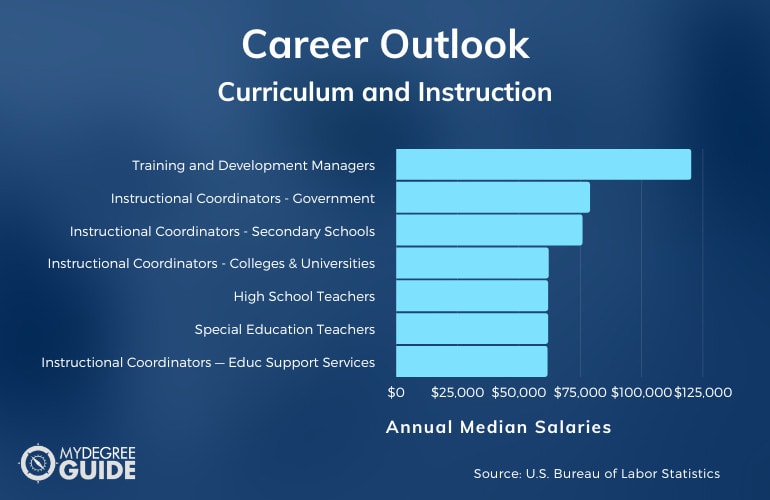If you want to become the most effective educator you can be, then you might consider earning a masters in curriculum and instruction.

This graduate degree is a common requirement for instructional coordinators, and it could help you advance your skill sets and professional qualifications in this growing sector.
Editorial Listing ShortCode:
Whether you work in a traditional classroom or a different educational setting, getting your masters degree in curriculum and instruction online could be a strategic move for your career.
Online Masters in Curriculum and Instruction Programs

If you care deeply about education and want to be a leader in your field, a masters in instruction and curriculum development may help you work toward your professional goals.
Whether you want a traditional classroom job or the opportunity to move into a new educational role, taking advanced courses in curriculum and instruction could be a strategic choice. For many teachers, a master’s degree is the key to higher pay. Some school districts automatically increase the salaries of employees who have taken graduate classes.
Plus, curriculum and instruction is a practical degree program with a lot of relevance for teachers, future instructional coordinators, and the overall education field. You may study:
- Curriculum planning
- Data collection
- Education research
- Gifted and talented students
- Leadership skills
- Learning differences
- Literacy education
- STEM education
- Student diversity
- Technology and online classes
This program usually includes a few concentration options. For example, you may be able to focus your studies on online instruction or STEM education. There may also be concentration tracks for literacy, special education, leadership, or gifted and talented education.
Editorial Listing ShortCode:
Many colleges don’t require a thesis component for this master’s degree program. Instead, there may be a capstone project during your final semester, or you may assemble a portfolio that synthesizes your learning. This type of graduate program can typically be completed online. There may be no in-person requirements, or you may have a mix of on-campus and online coursework.
Online education degree programs are especially useful for full-time workers who want to fit college classes around their other commitments. With an MA in Curriculum and Instruction, some graduates become more effective elementary or secondary teachers. Others qualify for new responsibilities, such as being a department head, curriculum director, or principal.
This degree can also be useful for people who want to be involved in education in other ways. For example, your focus may be on educational programming in community organizations or childcare facilities. Some professionals might transition to a career in curriculum publishing.
Typically, this type of program doesn’t lead to teacher licensure. A masters in curriculum and instruction is generally designed for people who are already qualified teachers or who teach in non-school settings.
Common Online Masters in Education in Curriculum and Instruction Concentrations

As you browse for online programs, you’ll notice that many include concentration options. These allow you to focus on a particular subfield of curriculum and instruction so you can tailor your studies toward the area that makes sense for your job and your goals.
Here are some common concentration options:
- Gifted Education. In this track, you’ll learn how to identify gifted students, plan enriching educational experiences for them, and help with their social needs.
- Leadership. While you’ll probably have a leadership-focused class no matter what concentration you choose, this track will dive deeper into the topic. You’ll explore ways that leaders can make a lasting difference in educational settings.
- Learning Disabilities. With this concentration, you can grow in your ability to develop learning plans for students with special needs. Depending on your program, you may focus on special education in general or narrow in on language-based learning disabilities, such as dyslexia.
- School Technology. In this track, you might develop your skills as an online educator and explore various forms of classroom technology that can increase engagement and encourage learning.
- STEM Instruction. The courses in a STEM concentration will focus on curriculum design for science, math, and related subject areas. The courses may cover project-based teaching, classroom technology, and student assessments.
You’ll typically have several classes—often at least three to five—that specifically address your concentration area.
Curriculum and Instruction Careers & Salaries

Studying curriculum and instruction at the master’s degree level could enhance your skills in the classroom. Whether you teach young kids or teenagers, this degree program could be relevant to your current career track. It can also be beneficial for special education teachers.
With a master’s degree, you may qualify for higher pay or lead-teacher roles. You might also be able to move into non-classroom roles in a school system. Examples include becoming a curriculum director or a school administrator.
Not all curriculum and instruction professionals work directly with students. Some are responsible for developing the learning materials that classroom teachers use. Some graduates use this degree to become a curriculum writer or editor.
According to the Bureau of Labor Statistics, the median wage for education, training, and library jobs is $57,220.
| Careers | Annual Median Salaries |
| Training and Development Managers | $120,130 |
| Instructional Coordinators — Government | $78,900 |
| Instructional Coordinators — Elementary and Secondary Schools | $75,840 |
| Instructional Coordinators — Colleges, Universities, and Professional Schools | $62,060 |
| High School Teachers | $61,820 |
| Special Education Teachers | $61,820 |
| Instructional Coordinators — Educational Support Services | $61,580 |
| Kindergarten and Elementary School Teachers | $61,350 |
| Middle School Teachers | $61,320 |
| Preschool and Childcare Center Directors | $47,310 |
Some roles may require additional credentials, such as a teaching license or an administrative certificate. Some people with this degree are involved in educational efforts outside of traditional schools.
For instance, preschool or childcare center directors are often responsible for the academic development of the kids in their care. People who work in museums or other community organizations may lead classes, workshops, and other educational programs.
Editorial Listing ShortCode:
Even adults need to learn new things. Depending on your focus area in school, you might be qualified to head up training programs for a company’s employees.
Master of Science in Curriculum and Instruction Curriculum & Courses

Although your curriculum will vary depending on your concentration area, you may take courses like the ones listed below:
- Active Learning: You may become more adept at using hands-on activities in your classroom, especially for STEM education.
- Assessment Tools: This course focuses on collecting student data, analyzing your findings, and relying on it as you consider instructional choices.
- Classroom Differentiation: You’ll discuss how to work with students of different academic levels and plan curricular approaches that help all of them meet the required standards.
- Diversity in Education: Students come to the classroom from different backgrounds and life experiences, and this course will help prepare you to lead and respond appropriately.
- Education Leadership: As you explore leadership principles, you’ll discuss ways that your strong leadership could benefit the students in your care.
- Evidence-Based Practices in Education: This course will focus on research and education theories and teach you to incorporate research-backed practices into your teaching method.
- Gifted Instruction: Learners who perform at a higher academic level than their peers may require a unique approach to education.
- Literacy Education: You’ll explore how children develop literacy, and you’ll discover ways to support children who are struggling in this area.
- STEM Instruction: This class will equip you with tools for teaching math, science, and related subjects in innovative ways, and you may also talk about assessment techniques for STEM education.
- Technology for Education: You can discover new ideas for incorporating technology and online platforms into your teaching style.
Course offerings can also vary from school to school.
How to Choose a Curriculum and Instruction Masters Online Program

What school best meets your needs as a graduate student? It’s up to you to decide, but the following tips may help you narrow down your options:
- Accreditation. In addition to regional accreditation for schools, you might also be interested in programmatic accreditation from the Council of the Accreditation of the Educator Preparation (CAEP).
- Length. If speed is your goal, you may be interested in an accelerated program. You can look for a program that requires just 30 credit hours and no thesis. Year-round courses can be helpful for quicker completion, too.
- On-campus requirements. It’s entirely possible to find programs that are 100% online, which is great for scheduling flexibility. Avoiding travel costs can also save you money. Even still, if you’d like to meet classmates and professors face-to-face, you can look into hybrid programs that have some on-campus offerings.
- Prerequisites. If you’re an educator outside of the traditional classroom setting, you can opt for a program that doesn’t require a teaching license.
- Schedule. Would you prefer ultimate flexibility or greater accountability? Some programs put you on a planned schedule, and others are self-paced. You may be required to watch live lectures at certain times, or an online learning portal might be available 24/7.
- Specializations. Concentration options vary, so it’s strategic to look around for the ones that best match your needs. Some schools offer just a few tracks, while others have a long list of options to consider.
Most curriculum and instruction programs aren’t licensure tracks. If you happen to select one that is, it’s beneficial to ensure that it meets your state licensing board’s requirements.
Admissions Requirements

When you apply to an online curriculum and instruction master’s degree program, you may be required to turn in:
- GRE score (not required by all colleges)
- Letters of recommendation from school or work leaders
- Personal essay about your academic and professional goals
- Resume that includes relevant professional experience
- School transcripts from your bachelor program and any previous graduate work
Some admissions boards also prefer candidates who achieved a certain GPA during their bachelor’s studies. A GPA of 3.0 or higher is a common requirement.
Online MEd in Curriculum and Instruction Accreditation

An online graduate program is considered credible if it’s offered by a regionally accredited college. Accreditation shows that a school has been independently evaluated by one of the seven regional accreditors in the US. A school is awarded regional accreditation if it has demonstrated that it meets or exceeds the set standards for a quality education.
Editorial Listing ShortCode:
There are many benefits to attending an accredited college. If you switch schools, your credits are more likely to transfer. You’ll also have a better chance of getting into a doctoral program. Plus, your employer may have more confidence in the education you have earned. Depending on your district’s policies, accredited graduate work may be required for a pay raise.
Financial Aid and Scholarships

Wanting to become a better educator is a noble goal, and financial aid may assist you on your journey. You can start by looking into government funding.
Filling out the Free Application for Federal Student Aid (FAFSA) can help determine your eligibility for need-based aid. This assistance may come from the federal government and also your state. Many graduate students receive government student loans. Grants are less common for grad students but are sometimes available for those in the education field.
You can also explore scholarship opportunities from your school or from outside organizations. Some school districts contribute to employees’ education costs as well.
Curriculum & Instruction Professional Organizations
Educators know how to sharpen and encourage other educators. To build your network of supportive professionals, you might consider joining a professional education organization. Common curriculum and instruction professional organizations include:
- American Association for Teaching and Curriculum (AATC)
- Association for Supervision and Curriculum Development (ASCD)
- National Education Association (NEA)
Professional organizations often equip their members with many beneficial resources. You may have access to journals, email newsletters, books, webinars, and continuing education classes. There may be national conventions or local meetings you can attend. Plus, membership often includes professional discounts and other bonuses.
What Is a Masters in Curriculum and Instruction?

A masters in curriculum and instruction is a graduate program that helps education professionals become more knowledgeable about planning lessons that meet students’ needs.
In this program, you can gain insights into education theories, learning standards, student engagement, and classroom technology. The classes you take may include topics on research in education, school leadership, teaching gifted students, and STEM education.
You may also be able to select a concentration to complement your career focus. For example, if you teach special education, you could specialize in learning disabilities. Science educators may want an MEd that focuses on project-based STEM learning.
What Can I Do with a Masters in Curriculum and Instruction?
A master’s degree in curriculum and instruction can help you develop your expertise as an educator. Some graduates utilize their skill sets in the classroom as a teacher. You may be able to specialize your degree for your particular area of teaching, such as math, literacy, or special education.
A number of graduates go on to work as instructional coordinators for a school or a district. That job might involve curriculum selection and teacher training. According to the Bureau of Labor Statistics, nearly half of all instructional coordinators work for elementary or secondary schools. Some professionals even go on to write or edit teaching materials for a curriculum publisher.
How Long Does It Take to Get a Master’s Degree in Curriculum and Instruction Online?

These programs usually require 30 to 36 credit hours and no thesis, so you may be able to earn your online master’s degree in 1 year to 2 years if you enroll full-time. Schools with thesis or internship requirements may take longer.
Editorial Listing ShortCode:
A part-time course load will also take longer but provide greater flexibility. Depending on your needs and circumstance, it might be worth the trade-off. If you’ve done any previous graduate work, you may have credits to transfer in. Transfer credit could help shave time off the length of a program.
What’s the Difference Between an MS vs. MEd in Curriculum and Instruction Online?
If you want to study curriculum design, you could opt for an online MS in Curriculum and Instruction or an online Master of Education in Curriculum and Instruction.
| MS in Curriculum and Instruction | MEd in Curriculum and Instruction |
|
|
Some schools offer different concentrations in their Master of Science (MS) track than in their Master of Education (MEd) track.
Is a Master’s in Curriculum and Instruction Degree Worth It?

Yes, a master’s in curriculum and instruction degree is worth it for many students. An education master’s degree helps many teachers reach a higher level of their districts’ compensation plans. It can also lead to new responsibilities, such as heading up a department or becoming an administrator.
Editorial Listing ShortCode:
Trained, experienced teachers are always needed. In addition, a masters program in curriculum and instruction is common for those who want to become instructional coordinators. According to the Bureau of Labor Statistics, new positions for that job title are growing at a 10% rate over the next ten years.
Universities Offering Online Masters in Curriculum and Instruction Degree Program
Methodology: The following school list is in alphabetical order. To be included, a college or university must be regionally accredited and offer degree programs online or in a hybrid format.

Arkansas State University offers a Master’s in Education—Curriculum and Instruction. The program aims to help practicing teachers attain licensure in fields such as Director of Curriculum and Instruction, Special Education, or Gifted and Talented. Offered 100% online, the master’s program requires 36 hours of coursework and can typically be completed within 20 months.
Arkansas State University is accredited by the Higher Learning Commission.

Ball State University’s Master of Arts in Curriculum and Educational Technology program is designed for current educators. Students may choose between Curriculum and Educational Technology tracks.
Both tracks require the completion of 30 credit hours and teach students about technology integration in learning contexts. The program aims to equip graduates with the knowledge needed to develop curriculum and examine critically dynamic technological trends.
Ball State is accredited by the Higher Learning Commission.

California State University—Bakersfield offers an online program for an MA in Education in Curriculum and Instruction. It seeks to teach K-12 teachers how to improve student learning by integrating concepts of education technology in their classrooms. To graduate, students must complete 30 credit hours of coursework and maintain a cumulative GPA of 3.0. The program can potentially be completed in 1 year.
California State University – Bakersfield is accredited by the WASC Senior College and University Commission.

Students hoping to gain knowledge of curriculum development can enroll in the Master of Education—Curriculum and Instruction online program from Eastern Washington University. To graduate, students must complete 49 credit hours of coursework and a 120 hour internship in their field of study. Students can potentially complete the coursework for the program in just 1 year.
Eastern Washington University is accredited by the Northwest Commission on Colleges and Universities.

Emporia State University offers a Master of Science in Curriculum and Instruction. The program aims to help working educators become leaders in education development and the design, implementation, and evaluation of curriculum.
This accelerated online education program requires the completion of 33 credit hours and usually takes about 12 months to finish. Students may also pursue a dual degree with this accelerated program.
Emporia State University is accredited by the Higher Learning Commission.

Florida International University offers an MS in Curriculum and Instruction with a concentration in Curriculum Development. The program aims to help students gain the experience needed to create impactful, positive changes in education and learning settings. This online master’s program requires the completion of 36 credits hours. Each course is 8 weeks long, and the program can potentially be finished in just 1 year.
Florida International University is accredited by the Southern Association of Colleges and Schools Commission on Colleges.

Florida State University offers an online program for a Master’s in Curriculum and Instruction. The program aims to hone educators’ knowledge of students, content, and standards to improve overall instructional effectiveness. To graduate, students must complete 30 credit hours of coursework. Students can typically finish the program in about 2 years.
Florida State University is accredited by the Commission on Colleges of the Southern Association of Colleges and Schools.

Georgia Southern University’s Master in Curriculum and Instruction program aims to provide a highly interactive environment in which to learn practical skills and knowledge. The 36 credit hour program promotes leadership and communication skills. The curriculum aims to help professional educators enhance their expertise to pursue advanced career opportunities in education and other related fields.
Georgia Southern University is accredited by the Commission on Colleges of the Southern Association of Colleges.

Liberty University offers a 36 credit, online program for a Master of Education in Curriculum and Instruction. Each class is 8 weeks long, and the program can typically be completed in 1.5 years.
This program is designed to equip learners with leadership skills that can be utilized in Christian, public, and private school systems. The curriculum also covers classroom management techniques and skills with the pursuit of advanced careers in education.
Liberty University is accredited by the Southern Association of Colleges and Schools Commission on Colleges.

Louisiana State University offers an online program for a Master of Education in Curriculum and Instruction. Students enrolled in the program must complete 30 credit hours of coursework that includes 18 core credits and 12 credits of specialization courses. The curriculum aims to teach students how to develop effective educational curriculum and policies.
Louisiana State University is accredited by the Southern Association of Colleges and Schools Commission on Colleges.

Mississippi College offers an online program for a Master of Education in Curriculum and Instruction. It aims to provide educators with much needed skills and knowledge to enhance learning experiences and improve teaching effectiveness.
Offered 100% online, this program requires the completion of 30 credit hours and can potentially be completed in just 10 months. The curriculum is designed to help students develop a strong foundation in current scientific research and pedagogy.
Mississippi College is accredited by the Southern Association of Colleges and Schools Commission on Colleges.

Pennsylvania State University offers a Master of Education in Curriculum and Instruction. The program is designed to help students and working professionals improve their knowledge of curriculum, teaching, learning, and educational supervision. It’s a 30 credit program that is delivered online. The program seeks to prepare graduates for the challenges facing education in various environments.
The Pennsylvania State University is accredited by the Middle States Commission on Higher Education.

Purdue’s online Master’s in Education in Curriculum and Instruction program aims to develop students’ skills in the development and teaching of curriculum.
It requires the completion of 30 credits, which can potentially be done in 18 months. The curriculum covers a variety of different methodologies. It seeks to teach educators how to meet new demands, assess student learning, implement procedures, and develop curriculum and evaluate its effectiveness.
Purdue University is accredited by the Higher Learning Commission of the North Central Association of Colleges and Schools.

Southern New Hampshire University offers a Master of Education in Curriculum and Instruction with 6 career-focused concentrations to choose from.
The program is designed for learners looking to create positive change within education and learning communities. The program requires the completion of 36 credit hours, which can potentially be done in just 15 months. Students can transfer up to 12 qualifying credits toward their degree.
Southern New Hampshire University is accredited by the New England Commission of Higher Education.

Texas A&M University offers a Master of Education in Curriculum and Instruction. The program combines theory, methodology, and practical content to help learners pursue advanced careers in education and other related fields. It’s a 36 credit, non-thesis program aimed at developing effective teaching and research tools to sharpen classroom practices and overall improve educational settings.
Texas A&M University is accredited by the Southern Association of Colleges and Schools Commission on Colleges.

The University of Cincinnati’s online MEd in Curriculum and Instruction program aims to equip students with the expertise they need to thrive in the dynamic field of education. The program offers three areas of concentration, all of which are offered online in a self-paced format.
The University of Cincinnati is accredited by the Higher Learning Commission.

Students can enroll at the University of Kansas for an online curriculum and instruction master’s degree. The program requires 30 credit hours and is completed in a series of 8 week courses. The curriculum covers effective instructional practices and curriculum development and seeks to develop skills that can improve students’ overall learning experiences.
The University of Kansas is accredited by the Higher Learning Commission.

The University of Massachusetts offers a Master of Education in Curriculum and Instruction that can be earned online. The program is designed for practicing teachers to broaden their professional knowledge of curriculum development and effective instructional practices. This online MEd program has varying credit hours depending on the students chosen concentration.
The University of Massachusetts is accredited by the New England Commission of Higher Education.

The University of Virginia offers a Master of Education in Curriculum and Development. The curriculum teaches industrial best practices for effective curriculum development strategies. The program requires the completion of 15 credit hours that are delivered entirely online in an asynchronous format. Full-time students can potentially complete the program in just 1 year, and part-time students can typically complete it in 2 to 3 years.
The University of Virginia is accredited by the Southern Association of Colleges and Schools Commission on Colleges.

Western Governor’s University offers a Masters in Curriculum and Instruction. This online program seeks to provide students with a platform in which they can become leaders in education and bring about reforms in education research.
The 10 courses required for the program can typically be completed in 2 years or potentially in 18 months with the accelerated program. To graduate, students must also complete a capstone project to demonstrate their knowledge.
Western Governors University is accredited by the Northwest Commission on Colleges and Universities.
Getting Your Masters in Curriculum and Instruction Online

Are you ready to advance your career in education? If so, you can head back to the classroom for a master’s degree in curriculum and instructional design.
Just as with a degree program in online learning design and technology, this program could refresh your creativity and advance your professional qualifications. You can learn from the latest research how to effectively reach the kids in your care.
As an educator, you likely already have a full schedule, so online college classes might offer a helpful solution. Accredited online programs, whether it’s online masters or online PhD programs in curriculum and instruction, will include the same material that you’d learn in a classroom, but you’ll have more flexibility in how you plan your day.
You can start exploring accredited schools today to find the online masters program in curriculum and instruction that’s right for you.

